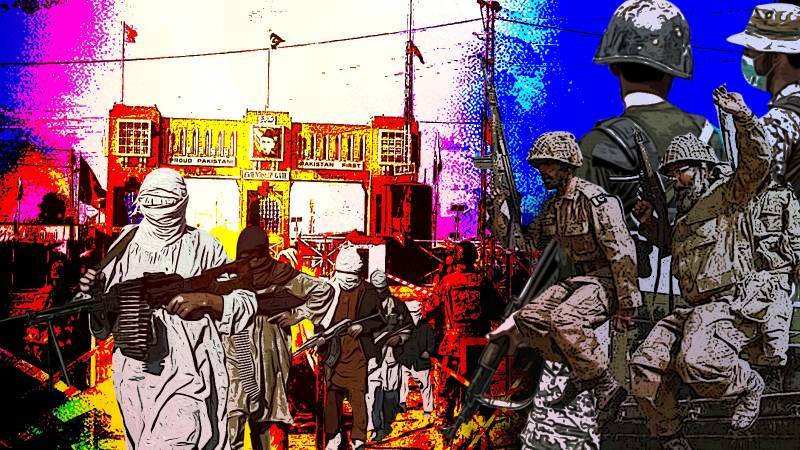
In today's world, societies are faced with a plethora of challenges. These are in the form of social, economic, political, technological, and environmental. Terrorism is also a socio-economic and political issue with global ramifications. The Western world is enjoying peace and harmony due to strong democratic norms and values. Developing world including most of Asia and Africa in general and particularly South Asia is on the verge of collapse because of democratic downturns. Pakistan, one of the South Asian nations, is faced with heightened extremism and terrorism despite its geostrategic position. The North Western border adjacent to Afghanistan which includes the Newly Merged Districts (NMDs)-the Ex-FATA is in the grip of a complex socio-economic vicious circle. The main cause is the failure of Pakistan's internal and external policies along with the military-bureaucratic nexus that led to ethnic and religious radicalisation. The situation worsened further after Pakistan’s alliance with the U.S. in counterterrorism efforts post-9/11, resulting in massive losses to lives and infrastructure.
Extremism is a multifaceted issue rooted in power struggles, radical ideologies, and regional influences. It emerges from economic deprivations, introversion, and a desire to fulfill materialistic agendas through distorted religious interpretations. In NMDs extremism has been significantly fueled by cross-border conflicts, social disintegration, unemployment, and a desire for power within extremist groups. Owing to this; peace, stability, and development are in tatters.
Over the last two decades, the people of the ex-FATA have suffered deeply from extremism. Despite Pakistan’s strong geo-political location, it is still reeling under the dark shadows of underdevelopment. Such has played a critical role in exacerbating extremism and radicalism creating feelings of discontent among the populace. In these circumstances, kidnapping and abduction for ransom discourage wealthy residents from returning which gives a path to economic stagnation. On the other hand, the United States faces numerous mass shootings but people still migrate there driven by economic opportunities over security concerns.
The merger of Ex-FATA in 2018 has alleviated some of the challenges but still tensions exist among different social groups. The main cause is the lack of clear regulations on mineral rights which have fueled disputes and violence in the recent past. The local preference for traditional dispute resolution mechanisms such as the jirga system further complicates the situation.
The relationship between Afghanistan and Pakistan is pivotal in shaping the socio-economic landscape of the NMDs. Both countries share deep historical, cultural, and linguistic ties, making their cooperation essential for regional stability. Despite trade opportunities, mutual distrust and historical border disputes continue to hinder effective cooperation. This situation has been exploited by external powers, further destabilising the region. To improve bilateral relations, both nations must engage in constructive dialogue, with local elders playing a key role in mediating conflicts.
Development programs in the NMDs must focus on inclusivity, with local leaders collaborating with government officials to address community needs
The ongoing extremism in the NMDs is partly driven by religious sectarian violence. Attacks on different sects, such as the 2023 Bajaur bomb blast and recent sectarian clashes in Kurram Valley, underscore the pervasive nature of this threat. Religious leaders wield significant influence in these communities and must be encouraged to promote unity and coexistence. Establishing inter-sectarian councils could help mitigate violence by addressing social and humanitarian issues, fostering empathy, and promoting peace.
FATA faces a "youth bulge," with a low literacy rate due to insufficient educational infrastructure. Educational endowments in the form of grants, scholarships and loans further aggravated the situation. This limits the youth's socio-economic opportunities and increases susceptibility to extremism. Recruiting local individuals into institutions that serve their communities can help foster a sense of responsibility, empowerment, and socio-economic development which ultimately reduces violence.
Politically, the NMDs have long been governed by hereditary systems, where political groups prioritise their interests over public welfare. Public services such as education and healthcare are often allocated based on political agendas, leaving marginalised communities deprived. To address this, governance must be transparent, accountable, and inclusive, ensuring that public services are distributed based on community needs rather than political affiliations.
Efforts to restore trust in government institutions and engage local communities in governance will enhance political participation and foster long-term stability. Development programs in the NMDs must focus on inclusivity, with local leaders collaborating with government officials to address community needs.
Global peace is interconnected and requires a multifaceted approach, combining political engagement, dialogue, and development initiatives. In regions like the NMDs, addressing the root causes of instability such as poverty, inequality and lack of access to basic services will help create sustainable peace. Empowering local communities and acknowledging their sacrifices will foster a shared commitment to building a peaceful and equitable world.
In concluding remarks, the NMDs continue to experience a resurgence of extremism and sectarian violence significantly affecting regional stability. Historical conflict dynamics coupled with ineffective governance have exacerbated the situation. Marginalisation of local voices fuels discontent which has further destabilised the region. To overcome the challenging environment, a comprehensive approach is required. First to integrate security interventions through a broader framework to strengthen the police system. The second is to bring prosperity through developmental projects; the third one is to enhance community engagement through social inclusions. Last but not least; the region is rich in natural resources but the government has not taken any concrete measures to tap their potential. So, to utilise these resources effectively; local tribal leaders must be involved in decision-making processes to attract investors and create economic opportunities for the local population. By fostering cooperation and empowering local communities, the region can achieve lasting peace and prosperity.

